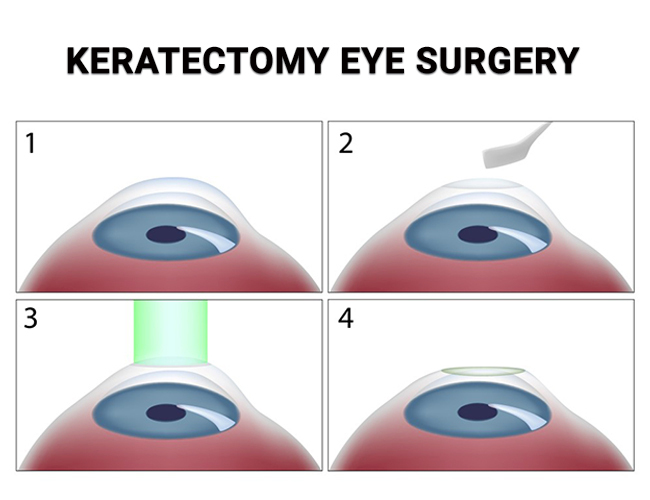 (212) 861-9797
(212) 861-9797
 (212) 861-9797
(212) 861-9797
The cornea is the outmost layer of your eyes. Its job is to protect the interior of your eye, as well as work with your lens to focus the light so you can see. But your cornea is vulnerable to damage. Sometimes, a keratectomy surgery corrects the problem and restores your cornea to full functionality. The best photorefractive keratectomy doctors in New York City are those at Vitreous Retina Macula Consultants of New York. There are three locations: Manhattan, Brooklyn and Westchester. Call today eye surgery centers for an appointment at the nearest office.
Keratectomy surgery is a corrective eye procedure to address cornea scarring or opacity. A top ophthalmologist may perform the procedure using traditional surgical tools or a laser device. The eye surgery improves your vision by smoothing an opaque or irregularly-shaped corneal epithelium. Your eye doctor uses one of several methods to create a smoother epithelium, which improves the functionality of your cornea, improving your vision.

Your cornea is the transparent piece in the front part of your eye that protects your eye from infection while focusing the light entering the eye. The cornea, together with the lens, refracts or bends light so that it hits your retina in perfect focus. Your cornea has five layers, which include from the outside:
An injury or abrasions to your eye causes the cornea to lose its transparency. Because of the sensitivity of your cornea, find the best retina specialists in NYC to perform keratectomy. The ophthalmologists and retina specialists at Vitreous Retina Macula Consultants of New York (VRMNY) have the skills and experience to perform cornea surgical procedures. This established eye practice has offices in Manhattan, Brooklyn and Westchester. The team also performs advanced laser surgeries to protect your vision.
Considering the importance of vision and the numerous serious diseases which pose a life changing threat, there is no room for error. The finest eye specialists in the country are found at VRMCNY. I have been a patient there for decades and have been seen by several doctors. They define the meaning of expert and consult with one another to ensure accuracy. The office is spotless. The staff is courteous and professional. The visits are usually time consuming due to the necessity of imaging and a preliminary exam with a technician before seeing the specialist. I consider myself fortunate and am very grateful to be a patient there.
RENEE B. GoogleYour eye doctor chooses a suitable keratectomy eye surgery procedure based on your individual diagnosis. Different keratectomy procedures address different problems with the cornea. The most common keratectomy eye surgeries include:
An eye specialist can choose any of these eye procedures to correct defects in the cornea and improve your vision. Your eye specialist at VRMNY uses powerful diagnostic imaging equipment to reach a correct diagnosis. From the diagnosis, your doctor creates the best eye treatment plan for improved results.
Keratectomy surgery is effective for a wide range of corneal disorders. Your eye specialist chooses the keratectomy procedure that best treats you for conditions that include:
The best photorefractive keratectomy doctors carry out careful diagnostic tests to determine if keratectomy can treat your eye’s cornea problem. The eye specialists at VRMNY have done years of research on eye treatments; they’re leaders in the development of treatment procedures. They have the expertise required to handle the complex surgery to treat corneal disease.
When your ophthalmologist performs a keratectomy procedure, the goal is to improve the function of your cornea. While the steps in each of the different procedures can differ, you can expect certain steps during this outpatient procedure to include:
A corneal problem is usually discovered during a routine eye exam. If you’re suffering from blurred vision, contact an eye specialist at VRMNY to get an accurate diagnosis. If keratectomy is the proper treatment, you can also have it done there.
Let us help you enjoy your life
Call: (212) 861-9797To Speak With An Appointment Coordinator Now